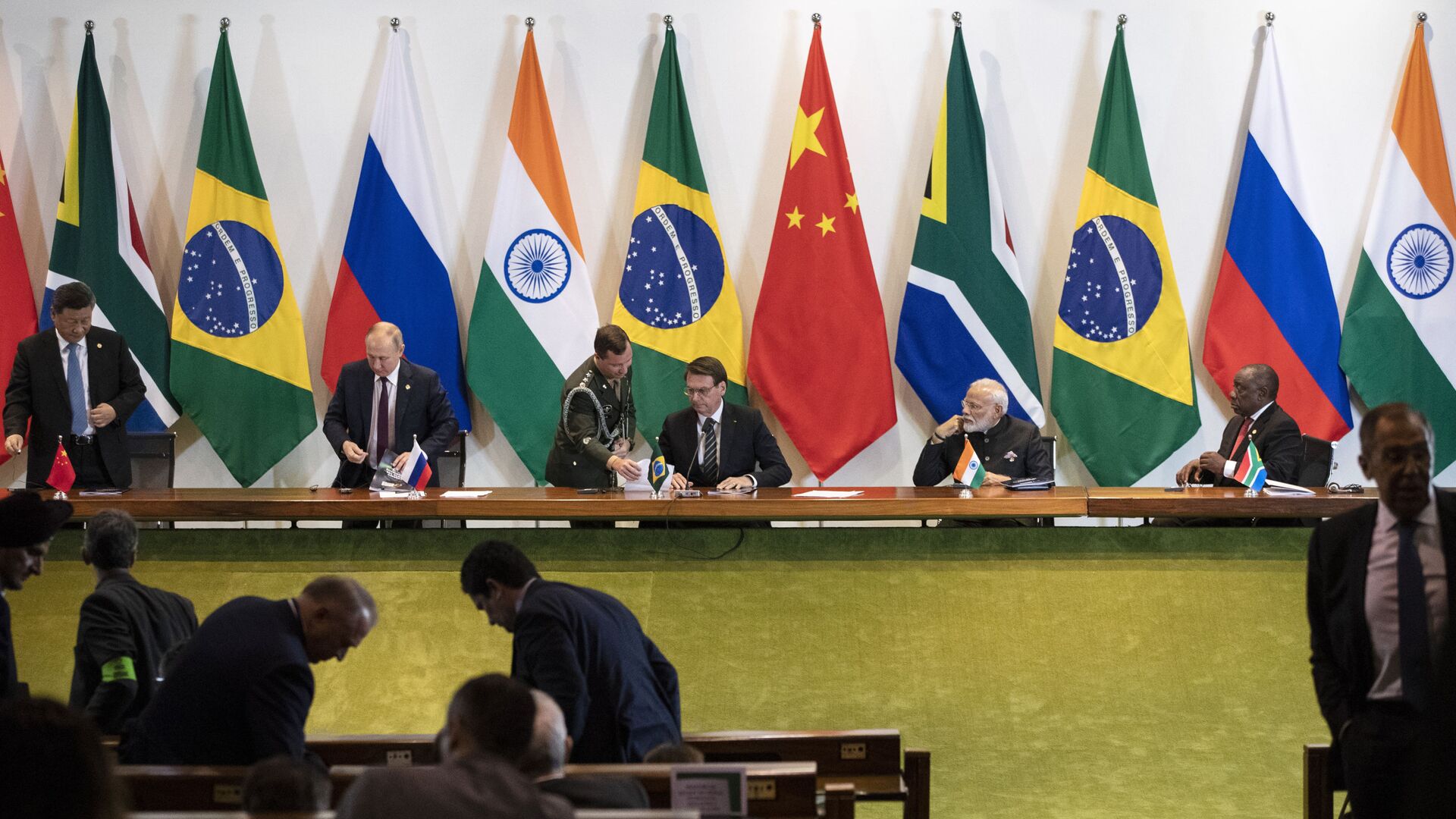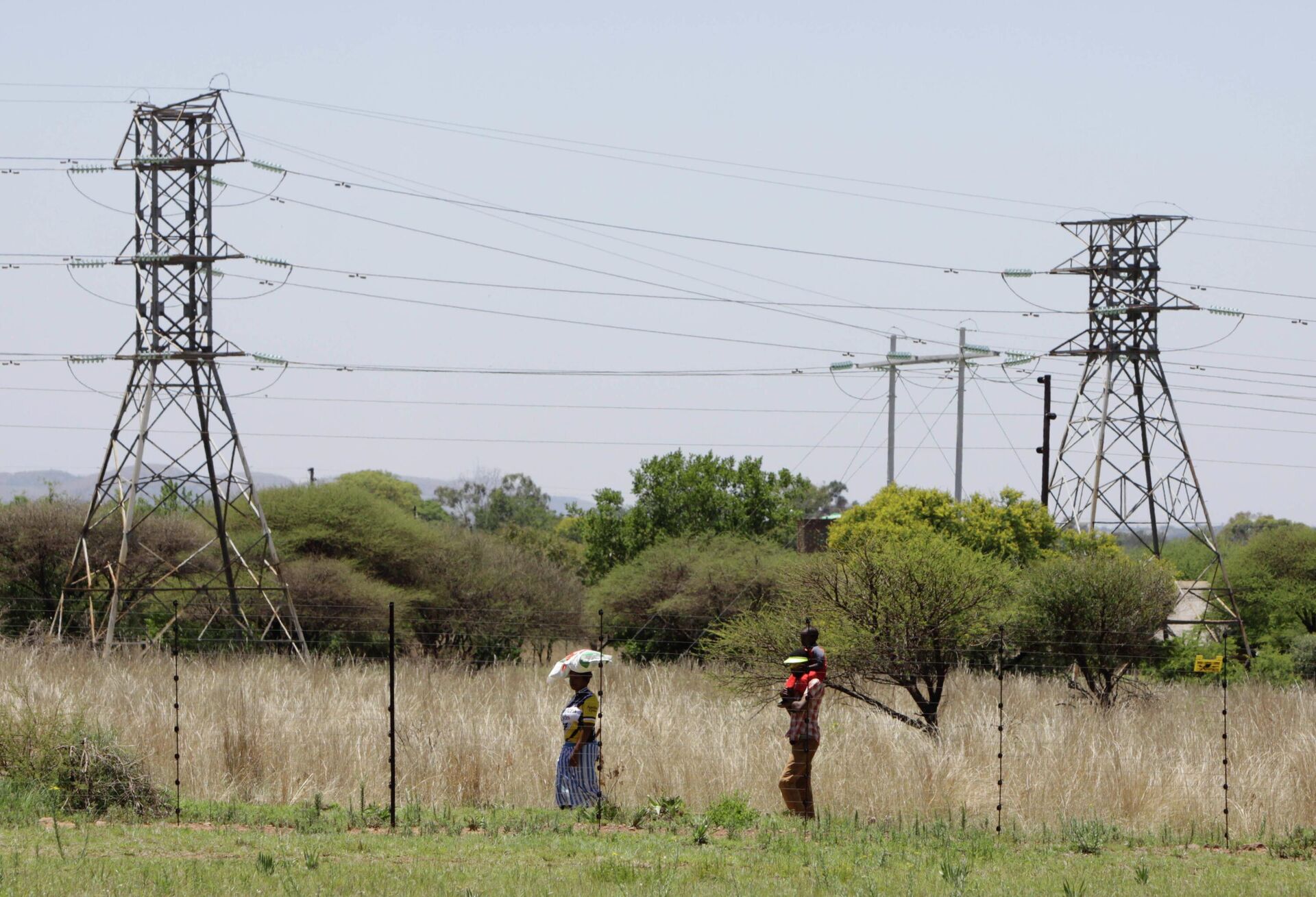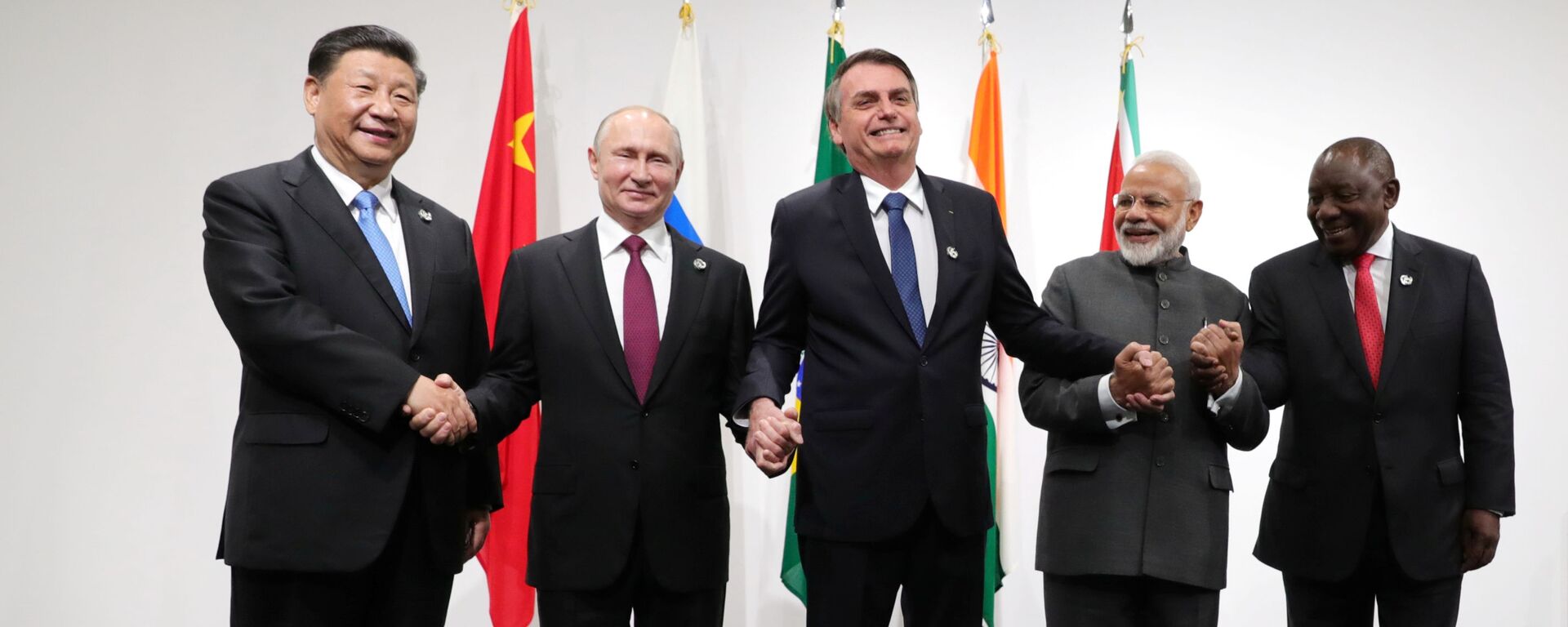https://sputnikglobe.com/20221223/south-africa-to-navigate-brics-as-de-globalization--western-decline-continue-1105735645.html
South Africa to Navigate BRICS as De-Globalization & Western Decline Continue
South Africa to Navigate BRICS as De-Globalization & Western Decline Continue
Sputnik International
As December 24 marks 12 years since South Africa's accession to BRICS, Sputnik takes a look back on the history of one of the influential multipolarity's... 23.12.2022, Sputnik International
2022-12-23T16:49+0000
2022-12-23T16:49+0000
2022-12-23T16:49+0000
africa
opinion
us
russia
europe
africa in details
brics
inflation
recession
globalization
https://cdn1.img.sputnikglobe.com/img/107731/37/1077313719_0:109:3073:1837_1920x0_80_0_0_b8de142811f66013bc39f11a199f2345.jpg
South Africa will chair BRICS from January 1, 2023. The nation's International Relations and Cooperation Minister Naledi Pandor has vowed to expand the grouping’s geographic reach, strengthen intra-BRICS relations and enhance South Africa's growth.The southernmost country on the African continent joined BRICS – the acronym for Brazil, Russia, India, China and South Africa – on December 24, 2010, and participated for the first time in the third BRICS Leaders’ Summit in Beijing in April 2011.From Economic Club to Political BodyFor the sake of fairness, "BRIC" was a western brainchild. It is believed that the acronym was coined by the Goldman Sachs economist Jim O'Neill, who argued in his 2001 report "Building Better Global Economic BRICs" that Brazil, Russia, India, and China "should be the building blocks of freshly overhauled global financial and governance systems."At that time "western arrogance" was profound under successive administrations of Ronald Reagan, George H.W. Bush, Bill Clinton and George W. Bush, according to Patrick Bond, professor of political economy at the University of the Witwatersrand. However, the West's influence began to falter with the Dot.Com financial crash of 2000-01 and the terror attacks on New York's World Trade Center and the Pentagon outside Washington on September 11, 2001.O'Neill projected that the collective gross domestic product (GDP) of the largest emerging market economies would steadily grow over the coming years thus creating unique opportunities for western investors. In the next few years Goldman Sachs went on promoting the informal bloc in its global economic analyses and forecasts.Some thoughts tend to materialize: in June 2006 BRIC was founded by the ministers of economy of Brazil, Russia, India, and China within the framework of the St. Petersburg Economic Forum (PEF). The initiator of the creation of the new association was Moscow.Initially, the group attracted little if any attention from the western media, being seen as a mere "talking shop." In addition, the 2008 global financial crisis stole the spotlight from the newly formed organization.Meanwhile, the entity's first summit in June 2009 clearly indicated that BRIC was more than the loose economic association described by Global Sachs in its prognoses. During the meeting, heads of the BRIC countries jointly called for the creation of a fairer "multipolar world order," thus challenging the US dominance, as western press noticed at the time.The BRIC's multi-polarity sentiment did not come out of the blue. First, the developing countries learned a good lesson from the whirlwind of the 2008 crisis sown by the United States' housing bubble and predatory lending."The economic crisis of 2007/8 did highlight to the BRICS founders the need to consider an alternative economic model for development and the intrinsic risk of the global economy under the continued guidance of western states and markets only," Dr. TK Pooe, senior lecturer in political science and governance at the University of the Witwatersrand, South Africa, and a public policy specialist at Wits University School of Governance, told Sputnik.Second, on February 10, 2007, the Russian President Vladimir Putin delivered a speech at the Munich Security Conference targeting the idea of the unipolar world order, highlighting its theoretical and practical shortcomings and bringing the focus on the unconstrained use of force by NATO and the US in the Balkans, Afghanistan and Iraq. The president also expressed his concerns over NATO's expansion, which contradicted security guarantees given to Russia by the West following the dissolution of the Warsaw Pact.South Africa & BRICSAs the organization evolved, on December 24, 2010, BRIC invited South Africa to join the club. The accession of the African nation raised eyebrows at the time: South Africa could not boast a robust economic performance; the country's GDP amounted to one-sixteenth of China's output; and it only had 50 million inhabitants. However, the nation was seen as representative of Africa and a gateway to the continent thus opening a new chapter in the bloc's history of expansion.The academic explained that the willingness of South Africa to join BRICS formation rested on two principles."Firstly, the need to have Africa represented in what theoretically should be a game-changing economic and political formation," noted Pooe. "Secondly, if the BRICS formation works economically the South African government could grow its economic potential in regions which are set to grow in the coming decades, and this could address internal problems like unemployment in South Africa."If one takes a look at macro-trends, one would see that South Africa's economic growth was turbulent due to the bitter legacy of colonial rule, apartheid and global crises.In April 1994, the country held its first democratic elections which resulted in the sweeping victory of the African National Congress (ANC), a social-democratic political party, with Nelson Mandela being elected as the new president of the post-apartheid state.After remarkable economic growth between 1997 and 2007, South Africa’s progress was upended in 2009 due to the global financial crisis. The nation needed a helping hand and it got one, once joining BRICS.Over the years BRICS grew more than it was initially projected by western economists and exceeded their most optimistic expectations. Currently, BRICS represents up to 25% of global GDP (measured in PPP of national currencies), 30% of land coverage, 18% of world trade and 40% of the world's population.In 2015, the BRICS states founded the multilateral New Development Bank in 2015 (formerly referred to as the BRICS Development Bank). The financial institution received the world's highest possible credit rating of AAA and facilitated BRICS' rise.Even though South Africa has shown modest economic growth over the past decade it saw a hike in 2021, when its annual GDP grew 4.9% (following a 6.9% contraction in 2020 over the COVID pandemic). Particularly, the nation's GDP accelerated by 1.2% in the fourth quarter of 2021, with manufacturing, agriculture, trade, and transport being the main drivers."South Africa is the smallest of the BRICS in population and smaller in economic clout, yet its financial, service, educational, cultural and scientific capacity is significant," Ari Sitas pointed out. "It has always insisted that its participation should also favor the broader African continent. South Africa was fully behind the need for a new development bank, the need for cooperation on health R&D and vaccine development, on women in development leadership, on technological and academic cooperation and on increasing the Mandela dividend for peace and conflict resolution."It goes without saying that the African state has benefited from joining BRICS, according to Dr. TK Pooe."The BRICS bank has been a crucial funder for some of South Africa’s energy problems," the academic observed. "South Africa’s political and international prestige/capital has benefited greatly from being part of this arrangement. This means when dealing with western states the South African government is always taken more seriously as its BRICS membership is associated with it being an African representative."BRICS EnlargementThe bloc of developing nations is set to grow further. In July 2022, BRICS International Forum President Purnima Anand announced that Turkey, Egypt, and Saudi Arabia may join the entity "very soon". Prior to that, Li Kexin, the head of the Department of International Economic Affairs of the Ministry of Foreign Affairs of China, also hinted at the possibility of Ankara, Cairo, and Riyadh's accession to the bloc during a press conference after the 14th BRICS Summit.Earlier, in June 2022, the Islamic Republic of Iran formally applied to join the group. Iran's BRICS membership would result in added value for the organization: the Middle Eastern nation holds the world's second largest gas reserves and fourth largest oil deposits.Some Latin American states are also seeking to join the bloc. In June, Argentinian President Alberto Fernández told the BRICS gathering that his country aspires to become a full member of the group.According to the academic, the beauty of BRICS is that it does not have "political ideological inclinations": this means that it does not matter whether its member is a conservative or a liberal state actor."What is important is the need to grow and provide economic models of development for BRICS and South-South states," Pooe pointed out. "This is an advantage and should focus each state on addressing their own internal economic weaknesses and potential and then, over time, look at how to provide an actual alternative to the current western-orientated arrangement. Let me be clear if this is done strategically it could work, but will require time.""BRICS is here to stay and grow as BRICS Plus is attractive to many nations," echoed Ashraf Patel, citing the fact that Egypt has become a member of the entity's New Development Bank and can benefit from finance.He highlighted that many nations in the Developing South aspire towards "better sustainable development and living conditions, addressing climate change, fair trade, gender etc."De-Globalization Trend Accelerated by WestAs nations seek new models of development, the unfolding economic crisis bites, demanding urgent solutions.Soaring inflation and recession engulfed industrialized and developing nations alike. On top of this, the disruption of global supply chains during COVID and the West's sweeping sanctions on Russia and decoupling from China have added to the emerging de-globalization trend.Moreover, it appears that the US is accelerating this trend to retain its unipolar moment, according to Richard D. Wolff, professor of economics emeritus at the University of Massachusetts, Amherst, and a visiting professor in the graduate program in international affairs of the New School University in New York.Under these conditions, the growth of BRICS is perceived as a threat and challenge by the US. While Washington opposes the enlargement of BRICS it has not yet decided (as far as public information suggests) how far to take its opposition, according to the academic."The new shift of Saudi Arabia toward China and Russia may become a flashpoint that reveals how far US opposition will be taken," Wolff suggested.The collective West's actions against Russia and China have become a wakeup-call for other BRICS member states. Beijing and Moscow are also decreasing their reliance on the West and its allies, with India signaling unambiguously that it does not want to participate in the US-led new "cold war."At the same time, African states are signaling dissatisfaction with the West's attempt to hinder their industrial development by prohibiting investments in fossil fuels. The emerging trend is likely to accelerate the rapprochement of developing countries under BRICS' umbrella.
https://sputnikglobe.com/20221213/chair-of-brics-in-2023-south-africa-to-enhance-cooperation-within-bloc-official-says-1105412852.html
https://sputnikglobe.com/20220616/13th-anniversary-of-first-summit-how-brics-became-a-vital-global-economic-and-political-force-1096382958.html
https://sputnikglobe.com/20221219/south-africas-cyril-ramaphosa-re-elected-as-anc-president-1105584336.html
https://sputnikglobe.com/20221222/uk-standard-of-living-falls-as-recession-deepens-amid-inflation-crisis-1105693788.html
africa
russia
china
south africa
brazil
Sputnik International
feedback@sputniknews.com
+74956456601
MIA „Rossiya Segodnya“
2022
News
en_EN
Sputnik International
feedback@sputniknews.com
+74956456601
MIA „Rossiya Segodnya“
Sputnik International
feedback@sputniknews.com
+74956456601
MIA „Rossiya Segodnya“
brics, south africa, new development bank, multi-polar order, developing countries, russia, china, india, brazil, inflation, recession, de-globalization
brics, south africa, new development bank, multi-polar order, developing countries, russia, china, india, brazil, inflation, recession, de-globalization
South Africa to Navigate BRICS as De-Globalization & Western Decline Continue
Longread
As December 24 marks 12 years since South Africa's accession to BRICS, Sputnik takes a look back on the history of one of the influential multipolarity's pillars, which the West initially derided as nothing more than a "talking shop".
South Africa will chair BRICS from January 1, 2023. The nation's International Relations and Cooperation Minister Naledi Pandor has vowed to expand the grouping’s geographic reach, strengthen intra-BRICS relations and enhance South Africa's growth.
The southernmost country on the African continent joined BRICS – the acronym for Brazil, Russia, India, China and South Africa – on December 24, 2010, and participated for the first time in the third BRICS Leaders’ Summit in Beijing in April 2011.
"South Africa joined BRICS because it has always wanted to be a voice for the global south, and sees BRICS as enabling it to do that," Roger Southall, emeritus professor in sociology at the University of the Witwatersrand, told Sputnik. "And given the historic legacies of anti-western imperialism shared by BRICS, it seemed an appropriate organ to join, especially as the African National Congress (ANC) has historically stressed membership of non-aligned organizations and multilateralism."
From Economic Club to Political Body
For the sake of fairness, "BRIC" was a western brainchild. It is believed that
the acronym was coined by the Goldman Sachs economist Jim O'Neill, who argued in his 2001 report
"Building Better Global Economic BRICs" that Brazil, Russia, India, and China "should be the building blocks of freshly overhauled global financial and governance systems."
At that time "western arrogance" was profound under successive administrations of Ronald Reagan, George H.W. Bush, Bill Clinton and George W. Bush, according to Patrick Bond, professor of political economy at the University of the Witwatersrand. However, the West's influence began to falter with the Dot.Com financial crash of 2000-01 and the terror attacks on New York's World Trade Center and the Pentagon outside Washington on September 11, 2001.
"So, in 2001, leading New York/London investment banker Jim O'Neill hypothesized that four 'emerging' economies were 'building bricks for the 21st century,' since their comparative advantages in manufacturing capacity (China), outsourced services (India), energy resources (Russia) and cash crops (Brazil) were generating a new era of coherence in the still-globalizing world economy," Bond told Sputnik.
O'Neill projected that the collective gross domestic product (GDP) of the largest emerging market economies would steadily grow over the coming years thus creating unique opportunities for western investors. In the next few years Goldman Sachs went on promoting the informal bloc in its global economic analyses and forecasts.
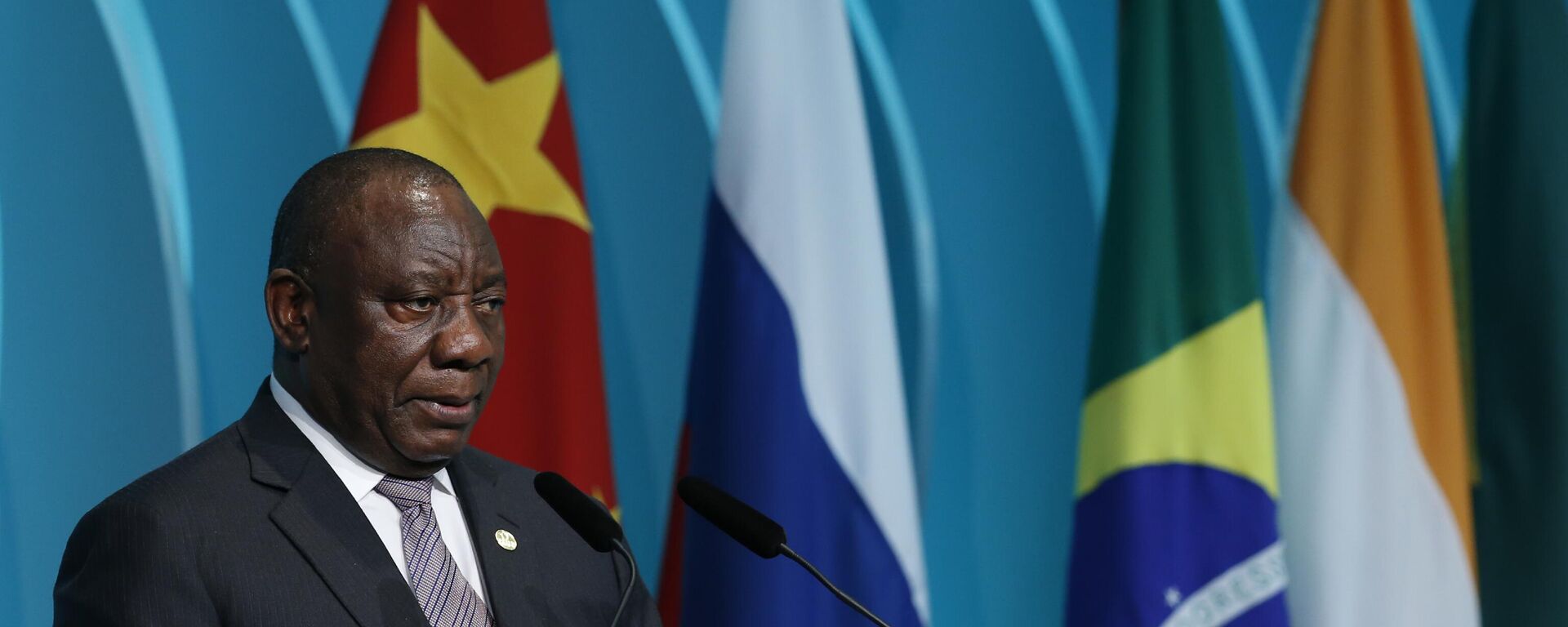
13 December 2022, 11:16 GMT
Some thoughts tend to materialize: in June 2006 BRIC was founded by the ministers of economy of Brazil, Russia, India, and China within the framework of the St. Petersburg Economic Forum (PEF). The initiator of the creation of the new association was Moscow.
Initially, the group attracted little if any attention from the western media, being seen as a mere "talking shop." In addition, the 2008 global financial crisis stole the spotlight from the newly formed organization.
Meanwhile, the entity's first summit in June 2009 clearly indicated that BRIC was more than the loose economic association described by Global Sachs in its prognoses. During the meeting, heads of the BRIC countries jointly called for the creation of a fairer "multipolar world order," thus challenging the US dominance, as western press noticed at the time.
The BRIC's multi-polarity sentiment did not come out of the blue. First, the developing countries learned a good lesson from the whirlwind of the 2008 crisis sown by the United States' housing bubble and predatory lending.
"The economic crisis of 2007/8 did highlight to the BRICS founders the need to consider an alternative economic model for development and the intrinsic risk of the global economy under the continued guidance of western states and markets only," Dr. TK Pooe, senior lecturer in political science and governance at the University of the Witwatersrand, South Africa, and a public policy specialist at Wits University School of Governance, told Sputnik.
Second, on February 10, 2007, the Russian President Vladimir
Putin delivered a speech at the Munich Security Conference targeting the idea of the unipolar world order, highlighting its theoretical and practical shortcomings and bringing the focus on the unconstrained use of force by NATO and the US in the Balkans, Afghanistan and Iraq. The president also expressed his concerns over NATO's expansion, which contradicted security guarantees given to Russia by the West following the dissolution of the Warsaw Pact.
"BRICS was a consequence of an emerging multipolarity," Ari Sitas, professor of sociology at the University of Cape Town, who was the chairperson of the South African BRICS Think Tank in 2014-2019, told Sputnik. "The ability of the US to steer the world in a unipolar direction waned and the double standards of the WTO met a point of fracture in Cancun in 2003. This was followed by a range of diverse attempts at cooperation between developing societies: IBSA was one, Beijing’s Africa outreach another; engagements between Russia and China led to BRIC. And then, to BRICS."
As the organization evolved, on December 24, 2010, BRIC invited South Africa to join the club. The accession of the African nation raised eyebrows at the time: South Africa could not boast a robust economic performance; the country's GDP amounted to one-sixteenth of China's output; and it only had 50 million inhabitants. However, the nation was seen as representative of Africa and a gateway to the continent thus opening a new chapter in the bloc's history of expansion.
"Truthfully speaking South Africa as an economy does not match the major BRICS economies," said Pooe. "What it has contributed is political capital on the continent and possible pathways for BRICS initiatives into Africa. And perhaps less discussed, South Africa tries to act as a behind the scenes voice between BRICS partners."
The academic explained that the willingness of South Africa to join BRICS formation rested on two principles.
"Firstly, the need to have Africa represented in what theoretically should be a game-changing economic and political formation," noted Pooe. "Secondly, if the BRICS formation works economically the South African government could grow its economic potential in regions which are set to grow in the coming decades, and this could address internal problems like unemployment in South Africa."
If one takes a look at
macro-trends, one would see that South Africa's economic growth was turbulent due to the bitter legacy of colonial rule, apartheid and global crises.
In April 1994, the country held its first democratic elections which resulted in the sweeping victory of the African National Congress (ANC), a social-democratic political party, with Nelson Mandela being elected as the new president of the post-apartheid state.
After remarkable economic growth between 1997 and 2007, South Africa’s progress was upended in 2009 due to the global financial crisis. The nation needed a helping hand and it got one, once joining BRICS.
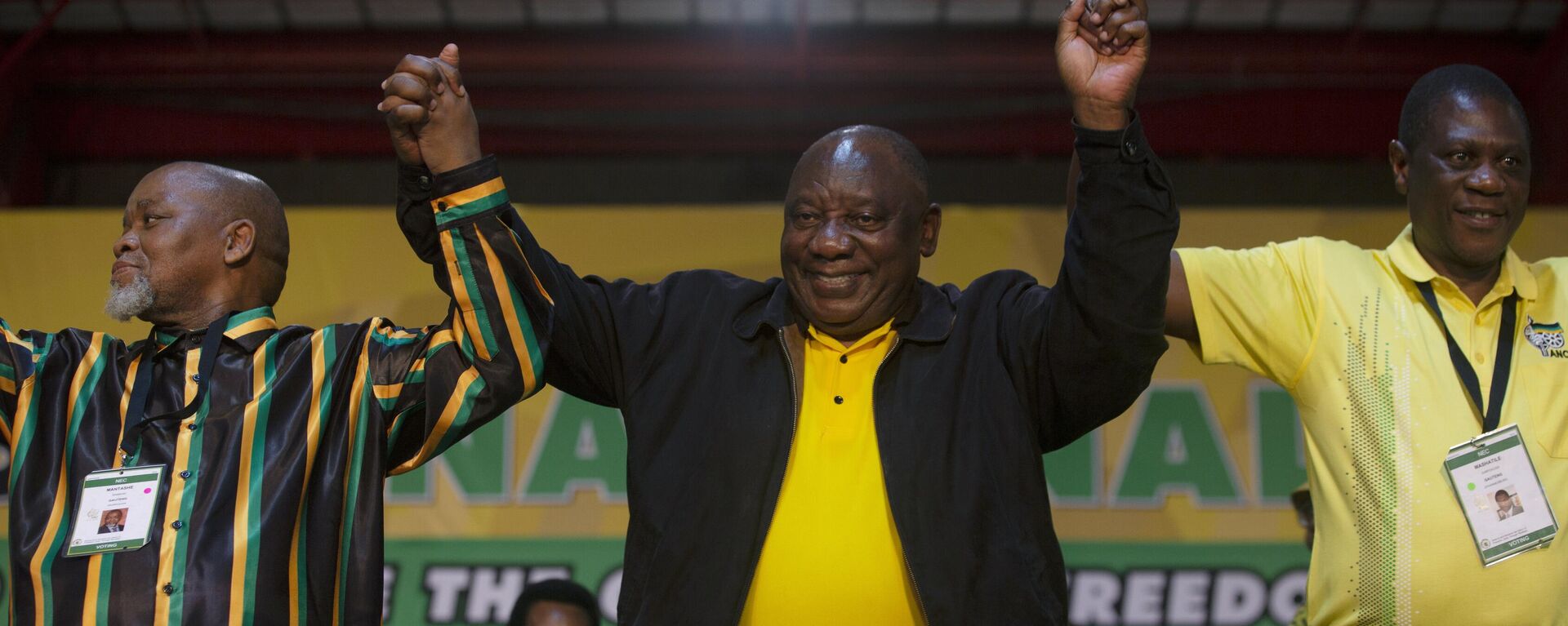
19 December 2022, 13:44 GMT
Over the years BRICS grew more than it was initially projected by western economists and exceeded their most optimistic expectations. Currently, BRICS represents up to 25% of global GDP (measured in PPP of national currencies), 30% of land coverage, 18% of world trade and 40% of the world's population.
In 2015, the BRICS states founded the multilateral New Development Bank in 2015 (formerly referred to as the BRICS Development Bank). The financial institution received the world's highest possible credit rating of AAA and facilitated BRICS' rise.
"Post the 2008 crisis, BRICS nations went further and became a platform bloc formation and are discussing interlinked issues such as: climate change, investment for development, digital economy, agriculture," explained Ashraf Patel, a senior research associate with the Institute for Global Dialogue and member of the South Africa BRICS Think Tank Network, speaking to Sputnik. "The focus of BRICS was developmental and reforming the international order to save humanity. New institutions such as the New Development Bank NDB show clearly how fast and institutionally solid the BRICS formation is evolving."
Even though South Africa has shown modest economic growth over the past decade it saw a hike in 2021, when its annual GDP grew 4.9% (following a 6.9% contraction in 2020 over the COVID pandemic). Particularly, the nation's GDP accelerated by 1.2% in the fourth quarter of 2021, with manufacturing, agriculture, trade, and transport being the main drivers.
"South Africa is the smallest of the BRICS in population and smaller in economic clout, yet its financial, service, educational, cultural and scientific capacity is significant," Ari Sitas pointed out. "It has always insisted that its participation should also favor the broader African continent. South Africa was fully behind the need for a new development bank, the need for cooperation on health R&D and vaccine development, on women in development leadership, on technological and academic cooperation and on increasing the Mandela dividend for peace and conflict resolution."
It goes without saying that the African state has benefited from joining BRICS, according to Dr. TK Pooe.
"The BRICS bank has been a crucial funder for some of South Africa’s energy problems," the academic observed. "South Africa’s political and international prestige/capital has benefited greatly from being part of this arrangement. This means when dealing with western states the South African government is always taken more seriously as its BRICS membership is associated with it being an African representative."
The bloc of developing nations is set to grow further. In July 2022, BRICS International Forum President Purnima Anand announced that Turkey, Egypt, and Saudi Arabia may join the entity "very soon".
Prior to that, Li Kexin, the head of the Department of International Economic Affairs of the Ministry of Foreign Affairs of China, also hinted at the possibility of Ankara, Cairo, and Riyadh's accession to the bloc during a press conference after the 14th BRICS Summit.
Earlier, in June 2022, the Islamic Republic of Iran formally applied to join the group. Iran's BRICS membership would result in added value for the organization: the Middle Eastern nation holds the world's second largest gas reserves and fourth largest oil deposits.
Some Latin American states are also seeking to join the bloc. In June, Argentinian President Alberto Fernández told the BRICS gathering that his country aspires to become a full member of the group.
"I think the offering of BRICS is more important than ever, especially if it includes more members like Nigeria, Indonesia, Argentina and others," said Pooe. "In theory this is a good idea and there is a need to cast the net wider, as one has stated in these answers. However, the key question is what are you including them into? If it’s the political block and ideal of BRICS this is fine and makes sense. However, questions about the economic potential will surface, in truth, non-western states want to join BRICS because they want an alternative economic model to the existing one."
According to the academic, the beauty of BRICS is that it does not have "political ideological inclinations": this means that it does not matter whether its member is a conservative or a liberal state actor.
"What is important is the need to grow and provide economic models of development for BRICS and South-South states," Pooe pointed out. "This is an advantage and should focus each state on addressing their own internal economic weaknesses and potential and then, over time, look at how to provide an actual alternative to the current western-orientated arrangement. Let me be clear if this is done strategically it could work, but will require time."
"BRICS is here to stay and grow as BRICS Plus is attractive to many nations," echoed Ashraf Patel, citing the fact that Egypt has become a member of the entity's New Development Bank and can benefit from finance.
He highlighted that many nations in the Developing South
aspire towards "better sustainable development and living conditions, addressing climate change, fair trade, gender etc."
"BRICS has the capacity and solutions for the new world order emerging, and working with the UN system," argued Patel. "The prospects are high as the Anglo Saxon capitalist world is in decline and democracy has become chaotic and corrupted. Nations are looking at viable alternatives and balanced models."
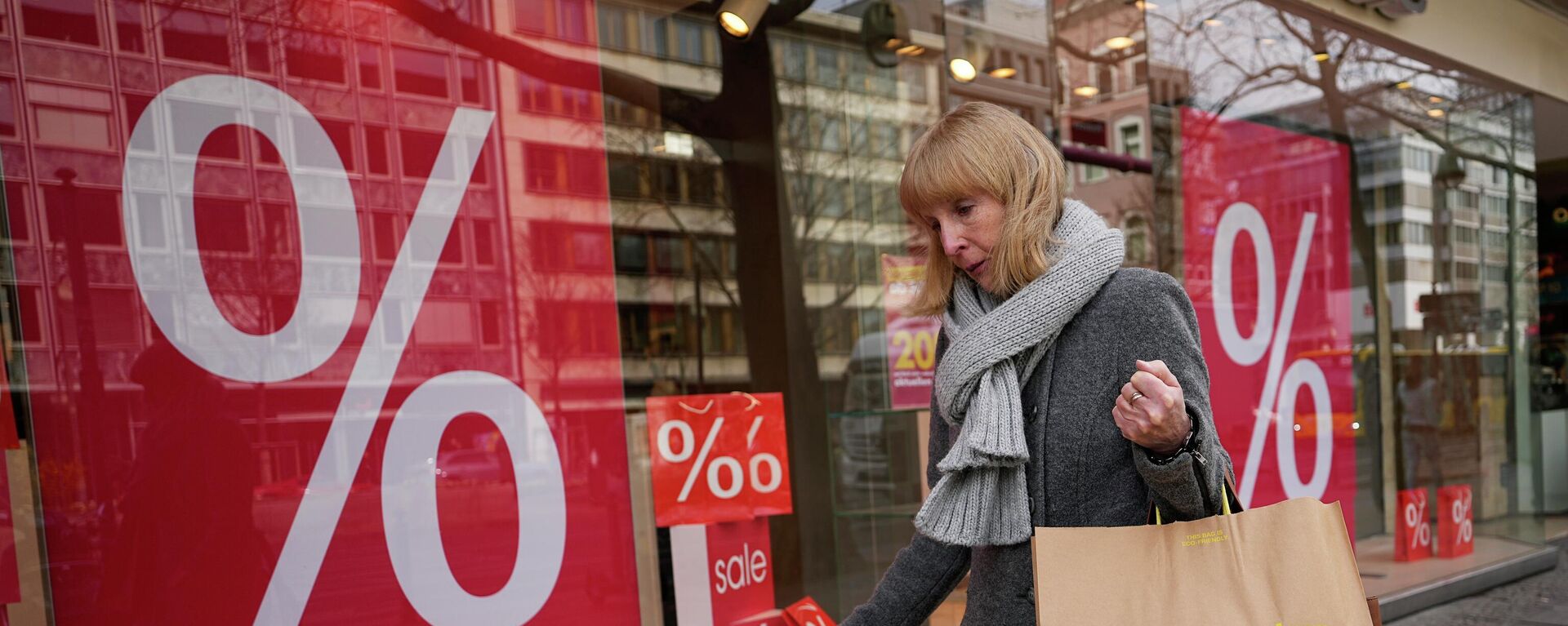
22 December 2022, 16:26 GMT
De-Globalization Trend Accelerated by West
As nations seek new models of development, the unfolding economic crisis bites, demanding urgent solutions.
Soaring inflation and recession engulfed industrialized and developing nations alike. On top of this, the disruption of global supply chains during COVID and the West's sweeping sanctions on Russia and decoupling from China have added to the emerging de-globalization trend.
Moreover, it appears that the US is accelerating this trend to retain its unipolar moment, according to Richard D. Wolff, professor of economics emeritus at the University of Massachusetts, Amherst, and a visiting professor in the graduate program in international affairs of the New School University in New York.
"The US response to these conditions includes two major developments," Wolff told Sputnik. "One is the abandonment of the neoliberal, globalist strategic focus for US capital. It has turned to economic nationalism instead in the hope of thereby salvaging as much of the declining empire as possible. The other is the US targeting of China as an enemy to be hobbled in its own economic and military development in every way short of nuclear war. China's allies - such as Russia - are to be hobbled as well."
Under these conditions, the growth of BRICS is perceived as a threat and challenge by the US. While Washington opposes the enlargement of BRICS it has not yet decided (as far as public information suggests) how far to take its opposition, according to the academic.
"The new shift of Saudi Arabia toward China and Russia may become a flashpoint that reveals how far US opposition will be taken," Wolff suggested.
The collective West's actions against Russia and China have become a wakeup-call for other BRICS member states. Beijing and Moscow are also decreasing their reliance on the West and its allies, with India signaling unambiguously that it does not want to participate in the US-led new "cold war."
At the same time, African states are signaling dissatisfaction with the West's attempt to hinder their industrial development by prohibiting investments in fossil fuels. The emerging trend is likely to accelerate the rapprochement of developing countries under BRICS' umbrella.
"BRICS will likely grow as many nations need to decouple from the problems of historical subordinations to the US and its empire now declining," Wolff assumed. "China will likely support that process and thereby strengthen its competitive position vis-a-vis the US. In short, recent history suggests greater stresses imposed upon the US. Its reactions thereto will also likely continue unless social changes inside the US generate new political movements with radically different notions of how to respond to the US decline at home and abroad."
